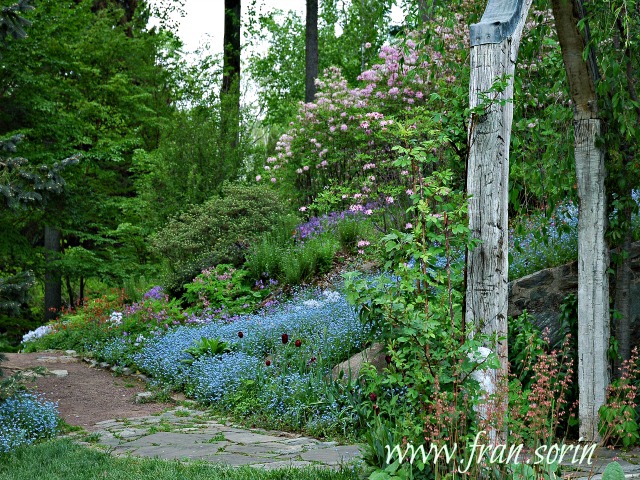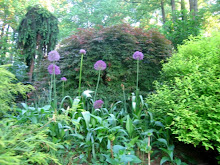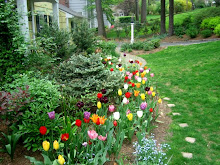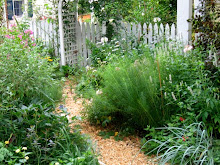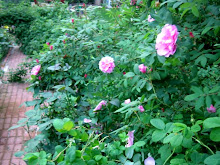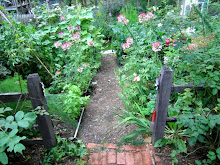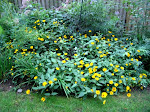


Welcome to Heirloom Gardener
Sunday, October 26, 2008
Spider Flowers (Cleome) in the Morning Sun after the Rain
Posted by
Julia Erickson
at
9:11 PM
1 comments
![]()
![]()
Labels: Autumn Garden
Friday, October 24, 2008
Garden Hopping: A Posy From My Garden
Click on the this post from Zoe at Garden Hopping for a picture of a truly inspiring autumn flower arrangement--roses, dahlias, berries, etc. I'm going to have to try something like this myself.
Posted by
Julia Erickson
at
1:14 PM
1 comments
![]()
![]()
Labels: Cut and Forced Flowers, Gardening Blogs
Thursday, October 23, 2008
Autumn Beauty: Japanese Beautyberry

"They are healthy and vigorous plants. I purchased very small plants and they grew quickly in the first year...For fall and winter arrangements, you can cut the branches with the Beautyberries. If you do so when they still have leaves, I recommend that you remove the leaves because they droop immediately after being cut."
For an additional post on propagation, click here.
Posted by
Julia Erickson
at
8:14 PM
1 comments
![]()
![]()
Labels: Autumn Garden, Japanese Beautyberry, Shrubs
Carrots and Kids: Now That's More Like It
Here's a great post from a fellow gardener and mother of five about what gardens with children really look like: "I like reading gardening and house magazines, supplements and blogs but not very many of these tell it like it is..."
Posted by
Julia Erickson
at
5:29 PM
1 comments
![]()
![]()
Labels: Gardening Blogs
Wednesday, October 22, 2008
Pee Gee Hydrangea: Four Seasons of Beauty
One of the many reasons I love hydrangeas is that they look good year-round (for a related post on year-round color, click here). Right now, their autumn colors are a highlight. See below some pictures of the pee gee hydrangea (Hydrangea paniculata) in the Front Border during all four seasons.
 Winter blooms turn light brown.
Winter blooms turn light brown. Spring after pruning (for a prior post about pruning pee gee hydrangeas, click here).
Spring after pruning (for a prior post about pruning pee gee hydrangeas, click here). Summer blooms of brilliant white.
Summer blooms of brilliant white.
Posted by
Julia Erickson
at
8:12 PM
3
comments
![]()
![]()
Labels: Autumn Garden, Front Border, Hydrangeas, Spring Garden, Summer Garden, Winter Garden
Gardening Gone Wild: Bananas in the Basement
This is a great post about moving the tropicals in for the winter. I don't have as many tropicals as the author Steve Silk, so just moved my elephant ears and other tropicals into the great room. The kids think it's like a jungle now.
Posted by
Julia Erickson
at
5:54 PM
0
comments
![]()
![]()
Labels: Gardening Blogs, Pruning and Maintenance
Tuesday, October 21, 2008
Autumn Beauty: Metamorphosis of the Blackberry Lily from Blooms to Seedheads
As a follow-up to last year's post on the Blackberry Lily (Belamcanda chinensis), I made sure to capture the delicate flowers this year in addition to the attractive seedpods and seedheads: "The blackberry lily blooms at the end of July over several weeks. The flowers and seed heads make great cut flowers for arrangements. These lovely seedheads develop in autumn." The first picture shows a close-up of the bloom.
"The blackberry lily blooms at the end of July over several weeks. The flowers and seed heads make great cut flowers for arrangements. These lovely seedheads develop in autumn." The first picture shows a close-up of the bloom. The second picture shows the plant in between the blooms and the immature green seedpods.
The second picture shows the plant in between the blooms and the immature green seedpods.
The third picture shows the plant shedding the now brown and papery seedpods to reveal the black seedheads from which they derive their name.
"Resist temptation: do not eat them. The seedheads persist into winter. They will drop and produce more plants the following spring. Although it does self seed, it is not prolific and gives a more natural look to the garden. The seedling take one to two years to reach blooming size. Note: they are deer resistant."
Posted by
Julia Erickson
at
9:49 PM
1 comments
![]()
![]()
Labels: Autumn Garden, Lilies, Seed Heads, Self Seeders
Monday, October 20, 2008
Why Husbands Are (or Should be) Supportive of their Wives' Gardening Interests: "When She is Happy, He Is."
Here's something to think about. Megan Basham in the article "Who Wears the Pants" (October 10th) in The Wall Street Journal writes:
"In the past few years, stay-at-home moms have come under fire from some of feminism's most hard-line mouthpieces. These mothers have been told that they're letting down the sisterhood, endangering the economy and -- most important -- undermining their own position. By failing to bring in at least half the family income, it is claimed, they have rendered themselves powerless in their own homes...
But as it turns out, wives don't need income to wield power in their marriages. And mothers don't have much reason to fear losing power if they're not bringing home an equal share of the bacon. A Pew Research Center study released a couple of weeks ago found that when it comes to decision making in the home, wives in a majority of cases either rule the roost or share power equally with their husbands, regardless of how much money the women earn...
To be fair, many of the scholarly studies' conclusions include a 'final say' contingency -- many husbands claim that they have veto power when they feel very strongly about an issue. But consumer research shows that with the exception of what car to buy and when to buy it, men rarely claim strong enough feelings to override their wives...
The general consensus of sociologists is that, whereas a woman's marital satisfaction is dependent on a combination of economic, emotional and psychological realities, a man's marital satisfaction is most determined by one factor: how happy his wife is. When she is happy, he is (emphasis added). Working within this framework, most husbands are unwilling to dig in their heels on any issue unless they have a tremendous incentive to do so..."
Posted by
Julia Erickson
at
10:14 AM
1 comments
![]()
![]()
Labels: Deep Thoughts About Gardening
Saturday, October 18, 2008
Index of Rose Photos on Heirloom Gardener (As of May 2009)
Here is an index of some of the rose photos that I have published on my blog over the past year. Some of the photos are accompanied with information about the rose and others are just pictures to enjoy. All of them are proven winners in my garden. As I post more, I'll do my best to update this list periodically. For the most recent posts, click here.
Apothecary (June) close-up
Apothecary (June)
Ballerina
Ballerina Hips (December)
Belinda
Cecil Brunner (October)
Celsiana (June)
Complicata
Complicata Hips (December)
.
Crimson Glory (May)
.
Dortmund
Dortmund (June)
Dortmund (October)
Dortmund Hips (December)
Excellenz von Schubert (November)
Fairy (October)
.
Felicite Parmentier (May)
.
Ferdinand Pichard
Graham Thomas (October)
Hansa
.
Henry Martin
.
Heritage (October)
Heritage Hips (November)
Heritage (December)
Jacques Cartier
Louis Odier (June)
.
Madame Plantier
.
Noisette (June)
Penelope (June)
Penelope (October)
Penelope Hips (November)
Rose de Rescht
Rouletti (June)
Rouletti (October)
Russell's Cottage (June)
Russell's Cottage Rose
Sophie's Rose (November)
Star of the Republic (June)
Star of the Republic
Sweet Brier hips (November)
Theresa Bugnet (June)
Thomas Affleck (October)
Veichenblau
Violetta (June)
Virginiana hips (November)
Posted by
Julia Erickson
at
8:51 AM
0
comments
![]()
![]()
Labels: Roses
Wednesday, October 15, 2008
Blog Action Day 2008: Three Types of Poverty
As a part of Blog Action Day 2008 on Poverty, here are three thoughts:
1. Natural Poverty. Least importantly, but most related to gardening, I believe that there is a natural poverty related to our increasing disconnection from nature. From Last Child in the Woods by Richard Louv:
"Within the space of a few decades, the way children understand and experience nature has changed radically...Today, kids are aware of the global threats to the environment--but their physical contact, their intimacy with nature, is fading..."
2. Material Poverty. Most immediately, material poverty is increasing in all of our communities, which is particularly hurting the poorest of the poor. Our priest has noted that our local food pantries which are typically well stocked all week are currently running out of food on Mondays. His direction to us? Come to church each Sunday with a donation of food. In addition, two great organizations to support which serve the poorest of the poor in the New York-New Jersey and many other areas around the world are:
a. Franciscan Friars of the Renewal
b. Missionaries of Charity
3. Moral Poverty. As a big fan of Russian literature, I read with great interest the August obituaries written in memory of Alexandr Solzhenitsen. All mentioned the critique of the West delivered at Harvard on June 8, 1978. From the address:
"However, in early democracies, as in American democracy at the time of its birth, all individual human rights were granted because man is God's creature. That is, freedom was given to the individual conditionally, in the assumption of his constant religious responsibility. Such was the heritage of the preceding thousand years. Two hundred or even fifty years ago, it would have seemed quite impossible, in America, that an individual could be granted boundless freedom simply for the satisfaction of his instincts or whims.
Subsequently, however, all such limitations were discarded everywhere in the West; a total liberation occurred from the moral heritage of Christian centuries with their great reserves of mercy and sacrifice. State systems were becoming increasingly and totally materialistic. The West ended up by truly enforcing human rights, sometimes even excessively, but man's sense of responsibility to God and society grew dimmer and dimmer.
In the past decades, the legalistically selfish aspect of Western approach and thinking has reached its final dimension and the world wound up in a harsh spiritual crisis and a political impasse. All the glorified technological achievements of Progress, including the conquest of outer space, do not redeem the Twentieth century's moral poverty which no one could imagine even as late as in the Nineteenth Century (emphasis added)."
Posted by
Julia Erickson
at
10:07 PM
4
comments
![]()
![]()
Labels: Deep Thoughts About Gardening
Tuesday, October 14, 2008
Garden Bloggers' Bloom Day: Autumn Blooming Roses in New Jersey
It's time again for Garden Bloggers' Bloom Day at May Dreams Gardens: yes, it's October and spring bulb planting and autumn cleanup has begun, but some of the roses are still blooming. While less numerous than the blooms of May-June, the autumn roses are especially welcome for their deeper colors that come from the cooler weather.
Roulette in the Egg Garden
Fairy in the Egg Garden
Thomas Affleck in the Children's Garden


Posted by
Julia Erickson
at
10:03 PM
6
comments
![]()
![]()
Labels: Autumn Garden, Garden Bloggers' Bloom Day, Roses
Plant Delights Nursery: A Slide Show of One of Heirloom Gardener's Favorite Nurseries
Ken Druse of the New York Times put together this great slide show of the gardens at one of my favorite nurseries: Plant Delights Nursery in Raleigh, North Carolina. Also, if you've never seen it, they also have the most humorous illustrations mixing gardening and political satire on the front of their catalogs.
Posted by
Julia Erickson
at
11:30 AM
2
comments
![]()
![]()
Labels: Nurseries
Saturday, October 11, 2008
Container Gardening: Autumn Container (and some Pumpkins and Gourds)
In a prior post on container gardening, I discussed my efforts to change the containers in the front border with the seasons.
In front of the house, the children picked out a selection of pumpkins and gourds from the farmers' market and the local nursery.
Posted by
Julia Erickson
at
9:13 PM
0
comments
![]()
![]()
Labels: Autumn Garden, Container Gardening
Friday, October 10, 2008
Times Online (UK): 51 Glorious Garden Websites
As an admirer of English gardens, I enjoy reading English gardening magazines, online newspaper articles, and blogs. Recently, Jane Owen, an editor of the Times Online gardening section, posted a list of "51 glorious garden websites." Seeing that most of these were from the UK, they were almost entirely new to me. A particularly inspiring set of websites which I never would have found on my own was the following:
Individual designers whose work I know and recommend
30 Cleve West - brilliant, subtle, sculptural work which has won many Chelsea golds. http://www.clevewest.com/
31 James Alexander Sinclair - highly original designs on new and historic sites plus one of the most entertaining blogs in the business. http://www.blackpitts.co.uk/
32 Andy Sturgeon - regular Chelsea medalist. Modern designs and planting. http://www.andysturgeon.com/
33 Ann-Marie Powell - one of the great underestimated creative forces in the garden works whose practical designs addresses all the senses. http://www.ann-mariepowell.com/mainmenu.html
34 Diarmuid Gavin - iconoclastic designs from the garden world’s wild boy. http://www.diarmuidgavindesigns.co.uk/
35 Tom Stuart-Smith - Statesman of the landscape world with elegance has the default position of his designs. http://www.tomstuartsmith.co.uk/
36 Phillippa May - new kid on the block. Landscape architect already transforming private estates in the north of England. http://www.phillippamaydesign.co.uk/
37 Bunny Guinness - excellent practical designs particularly for family gardens. Outstanding planting. http://www.bunnyguinness.com/
Posted by
Julia Erickson
at
10:32 AM
3
comments
![]()
![]()
Labels: Online Gardening Resources
Thursday, October 09, 2008
Garden Bloggers' Design Workshop: Sheds and Outbuildings
 This month's Gardening Bloggers' Design Workshop at Gardening Gone Wild (one of my favorite places to share ideas with other gardeners) is on sheds and outbuildings. As much as I love sheds and outbuildings, the limitations of space and slope allow me only one, the fort (or playhouse) that is pictured here earlier this summer.
This month's Gardening Bloggers' Design Workshop at Gardening Gone Wild (one of my favorite places to share ideas with other gardeners) is on sheds and outbuildings. As much as I love sheds and outbuildings, the limitations of space and slope allow me only one, the fort (or playhouse) that is pictured here earlier this summer.
In a prior post, I wrote about how we built it from scratch: "The entire project took about a month, mainly on weekends. The total cost of the materials was approximately $700. My husband did all of the work himself, except the cutting and installation of the walls which he did with a friend on a single afternoon."
Posted by
Julia Erickson
at
10:09 PM
4
comments
![]()
![]()
Labels: Garden Bloggers' Design Workshop, Gardening Tools and Structures
Wednesday, October 08, 2008
Telegraph.co.uk: The 20 Best Spring Bulbs
This article includes inspiring photographs of some of my favorite bulbs: "Elspeth Thompson chooses the bulbs to plant now and enjoy later...For me there is something unfailingly cheering and hopeful about bulb-planting – it even helped me through the death of a muchloved dog one sad October. It can be tiring if large numbers are involved, so alternate the big naturalistic swaths with handfuls of delicate beauties in pots that can be brought inside when coming into bloom.."
Posted by
Julia Erickson
at
4:56 PM
2
comments
![]()
![]()
Labels: Bulbs and Tubers, Spring Garden
Sunday, October 05, 2008
How to Garden on a Budget: Four Ideas to Reduce Spending in a Recession (Updated)
Well, even if Congress does manage to pass the Paulson Plan, it seems like the economy may still be headed for a recession. My husband and I are actively speaking about how we can reduce our spending, so here are four ideas related to gardening:
1. Reduce spending at the gardening center/plant nursery.
a. To the extent possible, reduce the number of plants you buy: take divisions and cuttings from your own plants; grow plants from seed; over-winter tropical and non-hardy plants, bulbs, and tubers; and/or barter for plants with your friends.
b. When you do buy plants, choose them wisely: avoid the new cultivars which are usually more expensive and buy tried and true or heirloom cultivars; buy the smaller, less expensive specimens and let them grow to their full size; and/or buy them in the off-season when they are no longer in bloom and the nurseries are usually happy to move them out of their inventory.
c. Instead of buying ready-made containers and hanging baskets, create your own. You can even re-use last year's potting soil by refreshing it with soil amendments.
d. Make your own compost and mulch.
e. Consider building your own flower/vegetable boxes.
f. Be a faithful, regular, friendly customer. In my experience as a well-known customer on a first name basis with all of the help, my local garden center offers me specials and discounts on volume purchases.
2. Reduce spending with the landscaping company. It's expensive to hire someone else to install plants, mulch beds, pull weeds, and/or do any number of gardening chores. Sure, it's more work to do it yourself, but you'll save a lot of money and probably do a better job. You can get your spouse ("we'll save money") and/or children ("I'll pay you") to help.
3. Reduce spending at the grocery store/florist. You can grow your own food or shop at the farmers' market. You can grow and cut your own flowers.
4. Reduce spending on entertainment. If you make your home and garden a more desirable place to quietly relax, play with your children, and/or entertain guests, you are guaranteed to spend less money going out.
Posted by
Julia Erickson
at
10:06 PM
6
comments
![]()
![]()
Labels: Nurseries
Saturday, October 04, 2008
Book Recommendation: Flowers and Herbs of Early America
Last weekend, I visited the New York Botanical Garden and picked up one of the best books I've found on heirloom plants: Flowers and Herbs of Early America by Lawrence D. Griffith and Photography by Barbara Temple Lombardi. The title speaks for itself and every spare moment I've had over the past week has been spent absorbed in this amazing book. Each flower and herb has four pages to itself, with two pages of inspiring photography and two pages of history, description, and habit. Reading the text, you can tell that the author has actual first-hand experience with these plants.
From the flap jacket: "Drawing on years of archival research and field trials, Colonial Williamsburg curator of plants Lawrence Griffith documents fifty-eight species of flowers and herbs, and explores how they were cultivated and used...It...is an important contribution to our understanding of colonial and Federal plants and an invaluable companion for today's gardeners, who will appreciate the advice of a master gardener on how to plan, choose appropriate species, and maintain a beautiful period garden."
Posted by
Julia Erickson
at
9:28 PM
0
comments
![]()
![]()
Labels: Books and Movies
Friday, October 03, 2008
The Best of Heirloom Gardener (So Far)
I. Trees, Shrubs, and Plants
- Two Perfect Flowering Plants for Arbors: Betty Corning Clematis and Dortmund Rose
- How to Prune Pee Gee Hydrangeas and Wisteria
- Hydrangeas: Why and How to Prune
- Growing Tulips in New Jersey: Squirrels, Deer, and Clay Soil
- Container Plantings: Variety, Soil, and Care
- Twelve Months of Garden Color in New Jersey (Zone 6b)
- How to Prune Roses, Part I: An Introduction
- How to Prune Roses, Part II: Old Rose Pruning Secrets
- How to Prune Roses, Part III: Why Prune?
- Hardy Annual and Biennial Self Seeders
- Forced Branches and Bulbs: Forsythia, Hyacinth, Tulips, Muscari, and Crocus
- Path Makeover: Replacing the Terra Cotta Stepping Stones with Pebbles
- Maintaining the Pebble Path
- Creating Space for a Garden: the Cutting Garden
- How to Build a Children's Playhouse (the Fort)
- How to Build a Sandbox
- Ten Tips for Planning a Children's Garden
- How to Build Raised Beds (on a Slope/Hill)
- Farmer's Almanac Spring Planting Schedule and Heirloom Seed Sources
- Organically Preparing the Soil for Planting
- How to Make the Perfect Soil Mix for Seed Sowing
Posted by
Julia Erickson
at
11:18 PM
1 comments
![]()
![]()
Labels: Gardening Blogs
Search Heirloom Gardener
Labels
- About Blogging
- Annuals/Biennials and Perennials
- Autumn Garden
- Books and Movies
- Botanical Gardens
- Bulbs and Tubers
- Children's Garden
- Chrysanthemum
- Clematis
- Container Gardening
- Crocus tommasiniasus roseus
- Cut and Forced Flowers
- Cutting and Rose Gardens
- Dahlias
- Deep Thoughts About Gardening
- Egg Garden
- Fences Arbors Walls and Paths
- Floral arrangements
- Front Border
- Fun Stories About Gardening
- Garden Bloggers' Bloom Day
- Garden Bloggers' Design Workshop
- Garden Planning
- Gardening Blogs
- Gardening Tools and Structures
- Gardening with Children
- Goldberry Hill
- Heirloom and Organic Food
- Hibiscus
- Holidays
- Hydrangeas
- Japanese Beautyberry
- Lilies
- Mixed Borders
- New Jersey / Local Interest
- Nurseries
- Online Gardening Resources
- Peonies
- Pest Control
- Picture This Photo Contest
- Piet Oudolf
- Poppies
- Propagation and Seeds
- Pruning and Maintenance
- Roses
- Seed Heads
- Self Seeders
- Shrubs
- Spring Garden
- Summer Garden
- Trees
- Wildlife in the Garden
- Winter Garden
- Zinia
Blog Archive
-
▼
2008
(202)
-
▼
October
(20)
- Spider Flowers (Cleome) in the Morning Sun after t...
- Garden Hopping: A Posy From My Garden
- Autumn Beauty: Japanese Beautyberry
- Carrots and Kids: Now That's More Like It
- Pee Gee Hydrangea: Four Seasons of Beauty
- Gardening Gone Wild: Bananas in the Basement
- Autumn Beauty: Metamorphosis of the Blackberry Li...
- Why Husbands Are (or Should be) Supportive of thei...
- Index of Rose Photos on Heirloom Gardener (As of M...
- Blog Action Day 2008: Three Types of Poverty
- Garden Bloggers' Bloom Day: Autumn Blooming Roses...
- Plant Delights Nursery: A Slide Show of One of He...
- Container Gardening: Autumn Container (and some P...
- Times Online (UK): 51 Glorious Garden Websites
- Garden Bloggers' Design Workshop: Sheds and Outbu...
- Telegraph.co.uk: The 20 Best Spring Bulbs
- How to Garden on a Budget: Four Ideas to Reduce S...
- Book Recommendation: Flowers and Herbs of Early A...
- The Best of Heirloom Gardener (So Far)
- White Flower Farm - Anne Raver Visits One of Heirl...
-
▼
October
(20)











